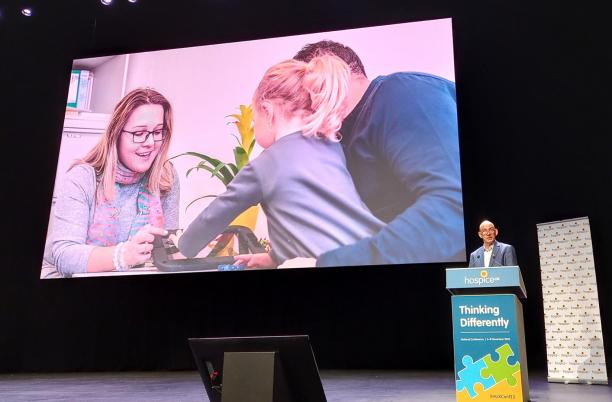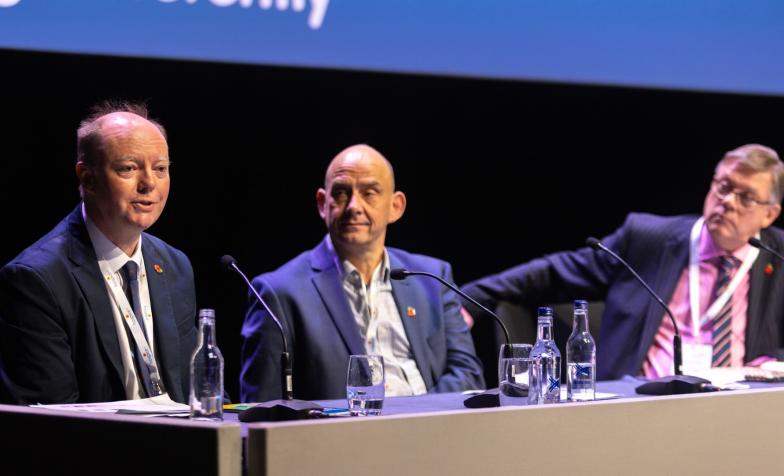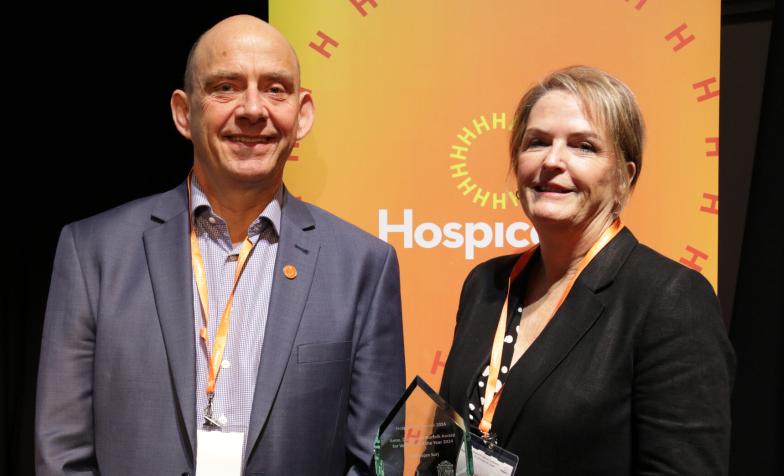

Hospice UK’s 2023 National Conference kicked off in Liverpool with an opening speech from our CEO, Toby Porter.
Read key points from the speech, plus highlights of conference sessions.
Title
What's on this page
Opening speech
In his opening speech, Toby Porter welcomed a record number of delegates to the annual event – this year titled ‘Thinking Differently’ – and shared his belief that the strong attendance reflected the important juncture at which the hospice sector finds itself in 2023.
“One of the very best things about our movement is our ability to connect and share openly with each other, and through that, to be nimble, adaptable and innovative,” he said.
“Relative to the wider health and care system, we are a tight-knit community, but one that enjoys the trust of local communities across the country. And together, we have an impressive national footprint.”
Porter went on to share some reflections on the changing demographics of the UK, and the challenges that our ageing population present for the health and care system. By 2040, estimates suggest that around 800,000 people a year will die – an increase of around 150,000.
With demand for end of life care services set to grow significantly, he argued that hospices across the country will have an increasingly important role to play.
“We should be confident and bold in asserting that our sector has the experience and knowledge to help the UK to do death better.”
To do that, Porter warned of the need for strong backing and support from government and national health bodies.
“We are too often an afterthought when it comes to key Government planning in areas that are fundamental to our ability to sustain – let alone expand – the vital services we offer.
“But if we stay true to our values, and are consistent in our advocacy, then I believe we will find that both the public and Government will support us in the years to come.”
Over the course of the coming three days, colleagues in Liverpool will share and discuss these, and many other challenges and opportunities facing the hospice sector in the UK.
Explore some of the highlights of the conference below.
Conference sessions: preview highlights
The conference programme this year is as full, varied and engaging as ever. You can register for a virtual conference ticket at any time throughout the three-day event in order to join the live streamed sessions.
Here are just some of the selected highlights – view the full conference programme to take a look at what’s happening across all sessions.
-
Plenary 1: Trends in health relevant to hospice and palliative care
Delivered by Professor Chris Whitty, Chief Medical Officer for England. 11.00 – 11.20
Changing epidemiology, scientific advances and demographic trends all mean the challenges we will face in palliative and end-of-life care will change considerably over the next 30 years. This talk will consider some of the areas where the changes we will need to respond to are likely or inevitable.
Parallel session 1.2: Working with politicians and the media (Live Streamed)
Panel includes: Peter Gibson MP; Alice Atkinson, Director of Income Generation & Communications, Bolton Hospice; Richard Duggan, Regional Editor North West, Bolton News. 13.30 – 14.45
Hospices have always been seen as part of their local community and rely on those relationships for funding, raising awareness and much more. In this session we will explore how working well with your local politicians and local media can enhance the work you do.
Parallel session 2.1: “Real and lasting change”: becoming an anti-racist hospice
Conference paper by Patricia Mbasani, Director of HR and OD, Royal Trinity Hospice; Emily Carter, Chief Executive, Royal Trinity Hospice. 15.30 – 16.45
This session includes four presentations of abstracts submitted via our Call for Papers. These abstracts are published in an online conference supplement produced by BMJ Supportive & Palliative Care, an official journal of Hospice UK.
Plenary 2: Artificial Intelligence and emerging technologies in palliative and end of life care –opportunities and challenges?
Delivered by Dr Amara Nwosu, Senior Clinical Lecturer in Palliative Medicine, Lancaster Medical School. 17.15 – 18.00
Dr Amara Nwosu will provide a broad overview of some of the technologies contributing to the development of artificial intelligence (AI) in palliative and end-of-life care.
In this session, he will discuss the opportunities, challenges and future implications of these technologies (e.g., analysis of electronic healthcare records to inform medical care; individualised support from virtual assistants and chatbots; health monitoring and support using data from wearables and sensors), in the management of palliative care, from population level and individual-focused perspectives.
-
Plenary 3: Live Well – Die Well: Frailty Care Closer to Home
Delivered by Daniel Harman, Consultant Community Geriatrician, Clinical Lead, ICC Frailty Team, City Health Care Partnership CIC. 09.00 – 09.45
Frailty is a life limiting illness that affects up to half of the population aged over 85 and costs the UK healthcare systems nearly £6billion per year. However frailty is not an inevitable part of ageing. The parallels between holistic frailty care and palliative care are obvious and closer integration is required to improve the lives of people living with frailty. This session will provide an overview of the strategic aims, evidence and delivery of a better way to support people living with frailty to age, live and die well.
Parallel session 3.4: Support for people experiencing poverty
Panel includes: Dr Naomi Richards, Director of the Glasgow End of Life Studies Group, University of Glasgow; Jill Bowen, Palliative Care Social Worker, Hospice of the Valleys; Sarah Bennett, Welfare Rights Advisor, Hospice of the Valleys; Lisa Hewet, Palliative Care Social Worker, Hospice of the Valleys. 10.45 – 12.00
People facing financial hardship are likely to have very different experiences of palliative and end of life care to their wealthier counterparts. Poor housing, insecure employment and a welfare system that can be challenging to navigate at the best of times often place additional stress on people facing terminal illness and their families. In this session, the panel will discuss how poverty and deprivation can influence and limit people’s choices at the end of life and how hospices can help to support them.
Parallel session 4.3: Data – the pitfalls, the power and the story (Live Streamed)
Panel includes: Dr Ros Taylor, Medical Director, Harlington Hospice; Professor Fliss Murtagh, Professor of Palliative Care, and Director of the Wolfson Palliative Care Research Centre, University of Hull. 13.30 – 14.45
We are thrilled that Professor Fliss Murtagh and Dr Ros Taylor are presenting this session on data and how to collate, analysis and utilise it for the benefit of palliative patients and service improvement alike. The session will include:
• Patient outcome data – the story it tells about the complexity of our case-mix and the im-pact of our care. Professor Murtagh is at the forefront of building the national evidence base to articulate the value of palliative and hospice-care.
• Patient demographics – the power of population health data in understanding the reach of our care. Dr Taylor is spearheading a collaborative hospice programme linking data to reprioritise service provision for changing and unmet patient need.
We will start the session with an overview of the Hospice UK data programme and some headline figures hot off the press from our 2023 hospice activity and demographic data survey. Where data and evidence must underpin everything we do, this session is a must for decision-makers, clinicians and data gurus alike
Plenary 4 - Prepared for the unthinkable? Lessons for the hospice sector from the Lucy Letby case
Panel includes: Dr Henrietta Hughes OBE, Patient Safety Commissioner; Joanne Bosanquet MBE, Chief Executive, Foundation of Nursing Studies; Dr Sam Kyeremateng, Medical Director and Clinical Lead for Programme Development, St Luke's Hospice Sheffield; Paul Farthing, Chief Executive, Shooting Star Children’s Hospices. 16.00 – 16.45
The Lucy Letby case understandably sent shockwaves through the healthcare sector. We were all asked to question whether such a case could have happened within the institutions we work and lead, and whether our safeguarding and whistleblowing procedures are sufficiently robust. Our panel will discuss the ramifications from the perspectives of patient safety, management, clinicians and nursing.
-
Parallel session 5.3: Getting on your nerves: neurological conditions and palliative care - Sponsored by Becton Dickinson (Live stream)
Panel includes: Dr Idris Baker, National Clinical Lead for Palliative and End of Life Care in Wales; Dr Luke Feathers, Medical Directors, LOROS; Dr Jonathan Martin, Consultant in Palliative Medicine, Central and North West London NHS Foundation Trust; Omina Yasmin, Clinical Nurse Specialist MND, LOROS; Chris and Kate Thurston - voices of lived experience. 09.00 – 10.15
This session will encourage hospices to engage with all patients including those with neurological conditions. It will provide an opportunity to hear the voice of lived experience, learn about a range of neurological conditions, why neuro palliation plays vital role and the importance of building staff confidence to care.
Parallel session 5.5: Novel approaches to the workforce shortages - Sponsored by PIB Insurance Brokers
Panel includes: Jane Turner, Interim Director of Patient Services and Nursing, Sue Ryder; Didi Petit dit de la Roche, Speciality Doctor, Isabel Hospice; Ann Casey, Ann Casey Consultancy Ltd. 09.00 – 10.15
In this session we will look at how we understand safe staffing levels in hospice inpatient units and how using innovative approaches to new models of care and the skill mix of staff can help address this.
Lunchtime session: “What Matters Most” - Welsh Visual Storytelling Project
Hosted by Ceridwen Hughes, Same but Different CIC. 12.30 – 13.15
A chance to view the film showing an exhibition inspired by Welsh photographer and director, Ceridwen Hughes’ own experience of end-of-life care, when her mother died in 2020. Through photography, film and written narratives you are introduced to the experiences of those living with dying and the caregivers involved in providing care and support.
An honest, raw and inspiring account of ‘what matters most?’ in life and in death aimed at improving end of life care provision in Wales through the experiences of those receiving and delivering care.
Parallel session: 6.2 Palliative care in remote and rural areas: challenges and opportunities
Panel includes: Professor Mari Lloyd-Williams, Professor of Supportive and Palliative Care, Liverpool John Moores University / University of Liverpool; Michael Loynd, Macmillan End of Life Care Together Partnership Director, Highland Hospice / NHS Highland; Ivor Williams, Lead for End-of-Life Care, Institute of Global Health Innovation, Imperial College London. 13.00 – 14.00
The UK’s diverse geography presents unique challenges to delivering palliative and end of life care in remote and rural communities. More older people live in rural areas and demand for palliative care is rapidly growing, but long travel times, poor infrastructure and public transport, as well as staffing issues can make it hard to meet people’s needs.
In this session we will hear creative approaches and new opportunities to address these issues, while considering the emergence of new challenges, including digital exclusion, that may disproportionately impact people in remote and rural areas.
Parallel session: 6.3 Hospice UK Strategy: Where next? 13.00 – 14.00
Update on results from our recent strategy consultation and our vision and mission for the future. Session will also provide an opportunity to ask questions of our CEO Toby Porter and senior leadership team.
Parallel session: 6.4 International perspectives on palliative care – a interview with Hospice Africa and St Luke’s Hospice Sheffield (Live Streamed)
Panel includes: Dianah Basirika, Palliative Care Nurse and Nurse Trainer, International Programmes Department, Hospice Africa Uganda; Roselight Katusabe, Palliative Care Nurse and Health Services Coordinator, Clinical Department, Hospice Africa Uganda; Emma Matthews, Staff Nurse, Inpatient Centre, St Luke's Hospice Sheffield. 13.00 – 14.00
In January 2023, Emma Matthews from St Luke’s Hospice Sheffield visited Uganda to work with Hospice Africa. Now in November, two nurses from Hospice Africa, Dianah Basirika and Roselight Katusabe are making the return visit to the UK and we’re delighted they are joining us at conference.
More from the Conference
We'll be announcing Hospice UK award winners throughout the conference - find out who they are by checking our awards webpages.



